 Manufacturers, dispensaries, caregivers and patients alike seek reassurances that the medicinal Cannabis products, materials or services they produce or purchase can be trusted to meet their own expectations, conform to prevailing purity requirements, and are truly safe to sell and consume. In practice, this means that the source Cannabis material is submitted to, and is tested by, a trusted, appropriately-accredited laboratory. Choosing a technically competent laboratory for such analyses serves to minimize potential risks inherent to producing, supplying and/or receiving essential, pharmacologically-active products. A laboratory’s technical competence is therefore crucial to the manufacturer, the dispensary, the cultivator and, most importantly, the patient.
Manufacturers, dispensaries, caregivers and patients alike seek reassurances that the medicinal Cannabis products, materials or services they produce or purchase can be trusted to meet their own expectations, conform to prevailing purity requirements, and are truly safe to sell and consume. In practice, this means that the source Cannabis material is submitted to, and is tested by, a trusted, appropriately-accredited laboratory. Choosing a technically competent laboratory for such analyses serves to minimize potential risks inherent to producing, supplying and/or receiving essential, pharmacologically-active products. A laboratory’s technical competence is therefore crucial to the manufacturer, the dispensary, the cultivator and, most importantly, the patient.
Appropriate testing of Cannabis products and materials can be both expensive and time consuming, even if they are done correctly the first time. If initial processing or testing is carried out incorrectly, the costs and time involved in re‐testing can be even higher – as the product may have appeared to have failed to meet specifications or expectations. Accordingly, choosing a technically competent laboratory can serve to minimize chances of re‐testing or engaging costly recall plans. Choosing a competent laboratory can be difficult, as it involves finding an organization with the appropriate certifications and/or accreditation.
Development of a universal, internationally-recognized Cannabis-specific laboratory accreditation program – between ASA and American Association for Laboratory Accreditation (A2LA) –will significantly advance both patient and public safety, globally, and will solidify PFC as a provider of a vital, accredited Cannabis certification program {Please insert link to Press Release}. The program will combine the expertise and resources of the country’s largest accreditation body with the scientific rigor and knowledge base of the nation’s largest medical Cannabis advocacy group. Accredited and certified laboratories under this program will achieve the clarity of the principle of “tested once, accepted everywhere in the world.”
For more than a decade, ASA has worked with technical committees composed of global experts from industry, consumer associations, academia, clinical researchers, NGOs, and government – working to create true and reliable standards for Cannabis and the Cannabis industry. Over the last 10 years, ASA and PFC, with their partner groups, have published the Cannabis Best Practices with AHPA and the AHP Cannabis Monograph – standards that have been adopted in Cannabis-medicine regulations by 16 States thus far.
The ISO and PFC standards were developed for, and continue to be improved by, a consensus of prevailing scientific understanding, and will further ASA’s mission of ensuring safe access to Cannabis for research and therapeutic use. Implementation of and compliance with the requirements of the PFC and A2LA program will effectively address those concerns associated with Cannabis health and human life, and will legitimize and streamline those laboratories tasked with serving the Cannabis community.
Implementation of a Cannabis-specific laboratory accreditation program – based upon the requirements of both ISO/IEC 17025 and ASA’ s Patient Focused Certification (PFC) Program – will result in far-reaching benefits for the myriad of laboratories tasked with Cannabis analysis. A few of the benefits are as follows:
- Confidence in meeting regulatory requirements
- Enhanced quality of processes and procedures
- Reduced errors, preventing re-testing of products
- Enhanced reliability and confidence in results Increased technical competency of staff and personnel
- Increased client satisfaction
- Improved reputation and image of Cannabis testing labs
- International acceptance
Additionally, implementation of ISO/IEC 17025 Cannabis laboratory specific accreditation provides a system for continuous improvement of daily laboratory practices. The A2LA/PFC Cannabis laboratory accreditation program will be internationally recognized by ILAC, which means that the resulting analysis can be a “passport” when submitting results to contractors, governments, or manufacturers that require independently verified laboratories.
More information:
A2LA Cannabis Accreditation Program




